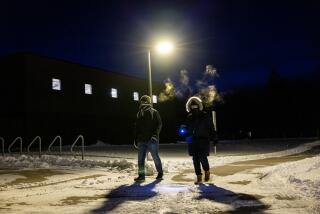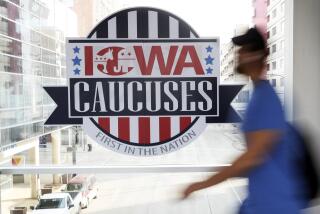Few Voters Committing to Edwards
- Share via
PARKERSBURG, Iowa — From Dubuque along the placid Mississippi River to browning cornfields in the west, presidential candidate John Edwards spent most of the last week spinning through Iowa in a gold minivan, charming Democrats gathered in living rooms, diners and basement meeting halls.
They laughed at his joke about greedy pharmaceutical companies, lapped up his tale of growing up poor in the South and cheered his excoriation of President Bush -- “walking around that ranch in Texas with that big belt buckle, acting like he is for regular people.”
Over and over again, in a dozen stops in the state with the first key test of presidential preferences, Iowans said they really liked Edwards, the U.S. senator from North Carolina. But most also said they weren’t ready to commit to him in caucuses that will be held around the state Jan. 19.
“I’m looking for a candidate who has the best chance of beating Bush,” Nick Lucy, a retired phone company worker and military veteran, said after meeting Edwards at a Dubuque home that overlooked the Mississippi. “His challenge is he is one of the younger ones. I’d consider him. But I’m really looking at [Massachusetts Sen. John F.] Kerry, because he is a veteran too.”
The reactions were symptomatic of the problem plaguing Edwards’ candidacy not only in Iowa but in New Hampshire, which conducts its crucial primary on Jan. 27. He receives high marks for his message and its presentation. But so far, such favorable reactions have translated into little steadfast support. Analysts speculate that the first-term senator simply remains too much of an unknown to most voters. And some suggest he may best be suited for the second spot on the Democratic ticket.
The question that now dogs the Edwards campaign is whether he can recapture the buzz that surrounded his candidacy when he ended the first quarter of this year as the top fund-raiser among the Democratic candidates.
That was more than six months ago and -- as Edwards comes to Los Angeles Wednesday for a tour of African American churches and a fund-raiser hosted by actor Ashton Kutcher at the home of actor Dennis Hopper -- he is struggling to gain some momentum before a series of primaries in early February that include a virtual must-win contest for him in South Carolina.
Signaling his commitment to his candidacy, Edwards has sworn off a Senate reelection bid next year. His campaign also has advertised extensively on television in Iowa and New Hampshire. Yet he languishes in the middle of the pack -- far from the lead -- in recent polls in both states.
A key reason for skepticism about Edwards’ chances is that his campaign has fallen off its early fund-raising pace. He collected only $2.6 million in the third quarter of the year, compared to the more than $7 million he raised in the first quarter.
The linchpin of Edwards’ strategy is a victory in South Carolina, which is shaping up as the most closely watched of seven primaries and caucuses on Feb. 3. But a lack of money and poor showings in Iowa and New Hampshire could frustrate his hopes.
Analysts looking for an explanation said Edwards had yet to be identified by voters with the kind of persona or single issue that have helped his top rivals: former Vermont Gov. Howard Dean, the antiwar crusader with the maverick, Internet-driven campaign; retired Gen. Wesley K. Clark, the decorated soldier and NATO leader; Kerry, the Vietnam War hero; and Rep. Richard A. Gephardt of Missouri, known for his pro-union stances and House leadership position. If Edwards has been stuck with a label, it has often been “young and untested.”
Hastings Wyman, author of the Southern Political Report, said Edwards had been hurt by “his relative inexperience and the fact he brings nothing to the table that plenty of others in the race don’t.”
Edwards’ campaign staff has seen how well the public responds to its candidate, however, and believes he stands poised to make a strong enough showing to keep his White House hopes alive. That likely means passing Kerry by to make at least a third-place finish in Iowa, said Larry Sabato, director of the Institute of Politics at the University of Virginia.
Edwards is staking his presidential aspirations on a populist appeal tailored to the middle class and poor. On nearly every issue and question posed to him last week, he returned to a broader message: that his upbringing as the son of a textile millworker made him ideally suited to understand the travails of everyday working people.
His 20 years as a plaintiff’s attorney were spent, he told Iowans, “fighting the big drug companies and the big insurance companies for families just like yours.” He created his “College for Everyone” plan -- with loans for a first year of college to be repaid by 10 hours of public service a week -- because of his own experience during college unloading tractor-trailers on hot summer nights in North Carolina. Bush’s support of tax cuts on investment income, he told every gathering, was “hurting people like you, who I grew up with.”
“What George Bush is doing is something radical. This president is shifting the entire tax burden from wealth and the wealthy to workers and the working class,” said Edwards, whose litigation victories made him a multimillionaire. “He is completely disconnected from the American people on this.”
Edwards, 50, tailored his most recent speeches around proposals for reforming the nation’s health-care system, unveiling a plan for improving nursing homes and another for lowering the cost of prescription medications.
His audiences were attentive to the specifics he provided, but what they seemed to like most was the way Edwards stepped forward to engage each of them with his honeyed drawl. Frequently, he broke into a wide, toothy smile. When a baby interrupted his description of the prescription medicine proposal with a squeal and clapping, Edwards did not miss a beat, laughing heartily and saying to the parents, “He liked that point, didn’t he?” before returning to his speech.
Audiences consistently cheered his sign-off line: “I still believe in an America where the son of a millworker can actually beat the son of a president for the White House!”
But many of the Iowans he encountered remain undecided or lean toward others. In the basement of a pizza restaurant in Waukon, lawyer Karl Knudson said he would likely support Gephardt. But Edwards “is young and energetic,” Knudson said, “and would be a good vice presidential choice if this doesn’t work out for him.”
But at the end of one of his 10-hour days, in a living room in Parkersburg, Edwards found the kind of voter he needs more of.
Cosmetologist Janice Hartz told the candidate how she has personally suffered from economic hard times and had to pay for her mother’s groceries “because when she pays her insurance supplement, she can’t afford to buy food and pay her own bills.”
In a hushed voice, Edwards said, “Bless your heart,” and Hartz continued, “I think you come the closest to being the one who understands what it’s like.”
Conceding that he has left his poor youth behind with his successful law career, Edwards thanked the woman and added, “You never forget where you come from.”
More to Read
Get the L.A. Times Politics newsletter
Deeply reported insights into legislation, politics and policy from Sacramento, Washington and beyond. In your inbox twice per week.
You may occasionally receive promotional content from the Los Angeles Times.











